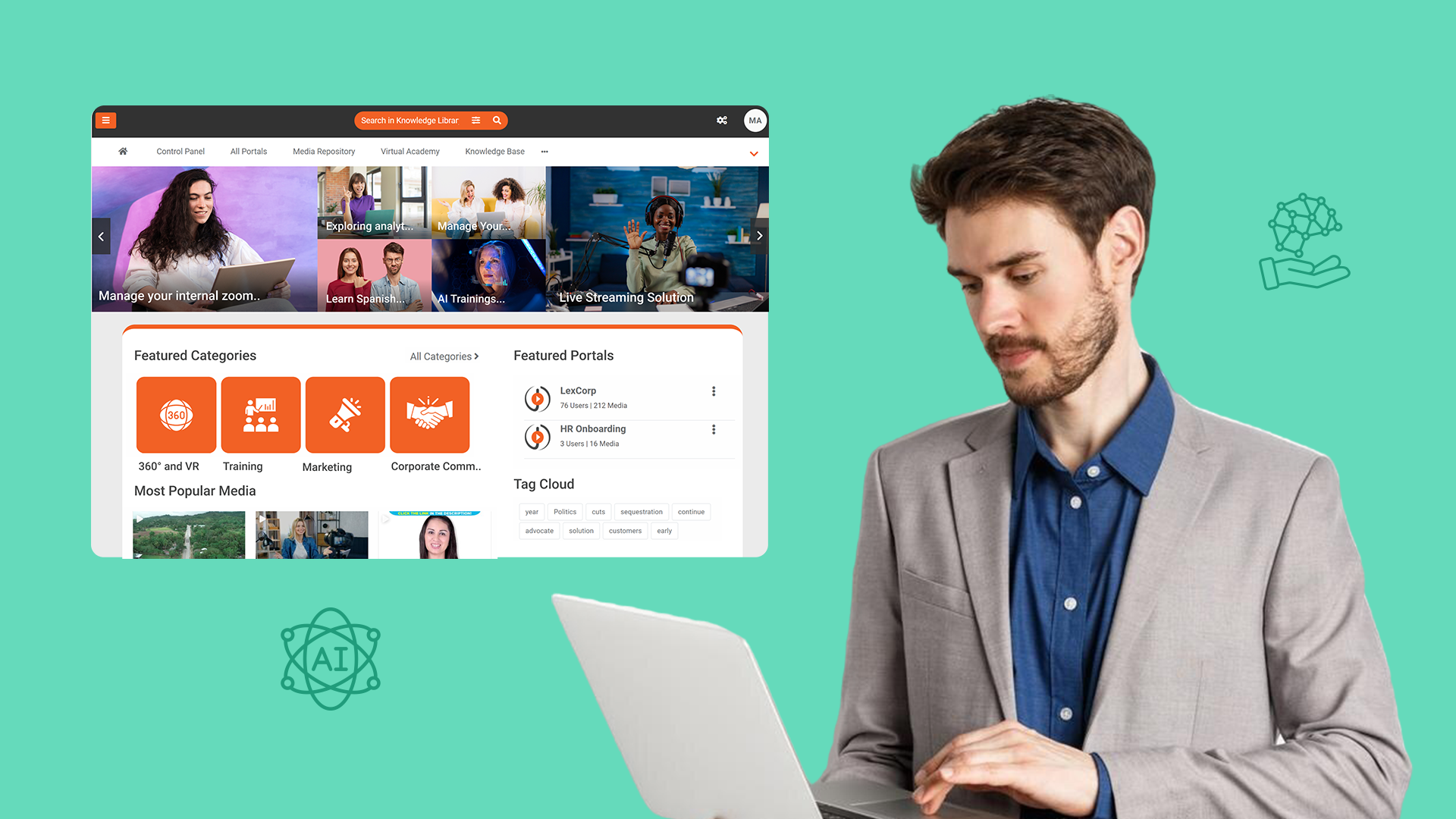Corporate Video Training with LMS | AI-Powered Employee Training Platform
by Hassaan Mazhar, Last updated: January 23, 2026, ref: HM1

In today’s digital workplace, video training has become essential to onboard, upskill, and engage employees efficiently. However, traditional learning management systems (LMS) alone often struggle with hosting, searching, and making video content truly accessible and valuable for learners.
To solve these challenges, modern enterprise video platforms like EnterpriseTube integrate seamlessly with LMS tools to provide AI-powered video training capabilities that boost retention, accessibility, and productivity. In this guide, we’ll explain how video training works with LMS, share practical workflow benefits, and showcase key AI features that make EnterpriseTube a complete solution for corporate learning and development.
Key Takeaways: Corporate Video Training with LMS (Quick Answer)
Corporate video training with an LMS works best when paired with an AI-powered enterprise video platform. While LMS platforms manage courses and tracking, advanced video solutions like EnterpriseTube enhance training with searchable transcripts, video summaries, AI-driven discovery, and structured navigation.
In simpler words, an LMS provides structure, but an enterprise video platform adds intelligence, accessibility, and efficiency to employee video training.
What You’ll Learn in This Guide
- How corporate video training integrates with LMS platforms
- Why traditional LMS video hosting falls short for large organizations
- How AI features like transcription, summarization, and video search improve employee training
- What makes EnterpriseTube an advanced corporate video training solution
Why Video Matters in Corporate Training
Video-based training can improve comprehension, reduce training costs, and serve diverse learning styles. With remote and hybrid work models, video enables:
- On-demand access to critical training materials
- Consistent delivery of compliance and safety training
- Engaging formats that increase retention
- Reduced time to competency for new hires
But video training is only as effective as the platform behind it. Simply uploading videos to an LMS doesn’t solve the core issues of discoverability, accessibility, or analysis.
How LMS and Enterprise Video Platforms Work Together
An LMS provides structure, courses, assessments, progress tracking but often lacks advanced video support for large and unstructured libraries. This is where EnterpriseTube complements your LMS by adding a dedicated AI-powered video layer that improves how training content is managed, searched, and consumed within your learning ecosystem.
EnterpriseTube works alongside your LMS or integrates with it so that training videos are:
- Easily discoverable
- Accessible across languages
- Structurally organized
- Searchable and actionable
Together, they transform video training into a scalable and measurable learning experience.
AI-Powered Features That Enhance Corporate Video Training
The following capabilities show how EnterpriseTube elevates video training to support modern corporate learning workflows.
AI Transcription & Translation: Better Accessibility & Search
EnterpriseTube automatically generates accurate transcripts in 40+ languages, giving learners text alternatives that improve accessibility and search inside videos. Editable transcripts help learners skip to exactly what they need and ensure that content is usable by global teams.
Example / Value:
A multinational company can deliver consistent training without producing separate localized content.
AI Summarization: Saves Time & Improves Digestibility
Lengthy training videos are automatically summarized using AI, allowing employees to grasp key points before deep diving into full recordings. This accelerates learning and improves engagement.
Example / Value:
Learners quickly understand the lesson objectives without having to watch an entire hour-long session first.
AI Search (Faces, Text, Audio): Find Videos Faster
EnterpriseTube indexes spoken words, on-screen text, visual objects, and even recognized faces, making it possible to search for relevant video parts with precision. This saves hours of manual searching through training libraries.
Example / Value:
An HR team can search for the moment “workplace safety” was mentioned across thousands of hours of recorded sessions.
Automated Chaptering: Structured Video Navigation
AI breaks long recordings into meaningful chapters, giving learners structured navigation that maps to training topics or key moments. This makes videos easier to scan and digest.
Example / Value:
Employees can jump directly to “Compliance Guidelines” within a 90-minute onboarding video without scrubbing manually.
Built-in Enterprise Capabilities That Support Corporate Training
In addition to AI training features, EnterpriseTube provides a robust foundation for video learning that includes:
Secure Access & Role-Based Permissions
Protect sensitive training content with enterprise-grade security, access controls, and authentication integrations such as SSO.
Analytics & Insights
Track who watched what, how they engaged, and which training videos correlate with learning outcomes helping L&D teams measure effectiveness.
Seamless Integration with LMS & Enterprise Tools
EnterpriseTube supports integrations with LMS platforms and enterprise systems, enabling single-sign-on, unified content access, and centralized training delivery.
Real-World Training Scenarios Enhanced by EnterpriseTube
Whether your organization delivers compliance training, product certifications, or onboarding videos, leveraging an AI-enhanced video platform can transform how staff access and retain knowledge:
- Faster onboarding with searchable and summarized video modules
- Improved accessibility through multilingual transcription
- Reduced training costs by repurposing live sessions into on-demand lessons
- Actionable insights via analytics to refine future training
For organizations with large, complex video libraries — and those integrating video into enterprise LMS workflows, EnterpriseTube serves as a central hub that makes training more efficient and measurable.
Conclusion
Video training is no longer optional; it’s a strategic asset for modern corporate learning. When paired with an LMS, EnterpriseTube’s AI-powered video capabilities turn training libraries into discoverable, accessible, and actionable learning experiences.
From multilingual transcription and advanced search to automated chaptering and analytics, EnterpriseTube empowers organizations to deliver smarter, faster, and more effective training at scale.
Ready to elevate your video training?
People Also Ask:
What makes EnterpriseTube different from native LMS video hosting?
EnterpriseTube adds AI video search, transcription, structured navigation, analytics, and enterprise-grade integrations that most LMS platforms don’t provide out of the box.
Can EnterpriseTube work with existing LMS platforms?
Yes, EnterpriseTube can integrate with or complement your existing LMS setup so that videos remain accessible through your learning systems while being enhanced and organized in a dedicated video layer.
How does AI chaptering help learners?
Automated video chaptering breaks long content into logical sections, allowing learners to jump directly to specific topics without watching irrelevant material.
What is the future of corporate video training with LMS tools?
The future includes increased use of AI for personalized learning experiences, more immersive technologies like AR/VR, and greater emphasis on continuous learning and skills development.
Can an LMS integrate with other corporate systems?
Yes, most advanced LMS tools offer integration capabilities with HR systems, performance management tools, and other software, enabling a seamless flow of information and enhanced learning experiences.
Jump to
You May Also Like
These Related Stories

AI Video Auto-tagging: Why It Matters

7 Key Reasons Why Enterprises Need AI-Powered Video Content Management



No Comments Yet
Let us know what you think